JCMG Orthopaedic Center
1225 West Stadium Blvd
Jefferson City, MO 65109
3520 West Edgewood Drive
Jefferson City, MO 65109
1225 West Stadium Blvd
Jefferson City, MO 65109
3520 West Edgewood Drive
Jefferson City, MO 65109
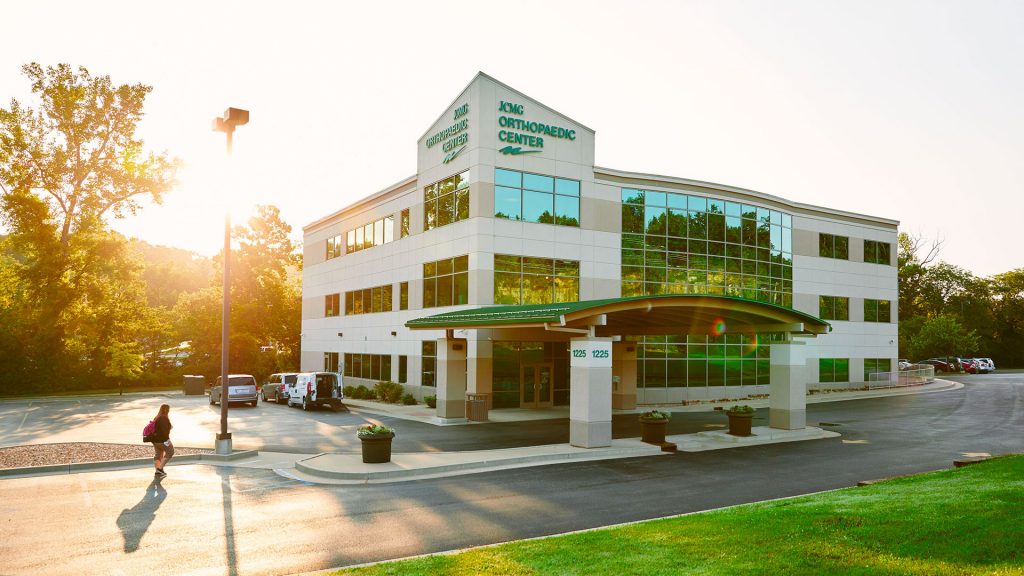
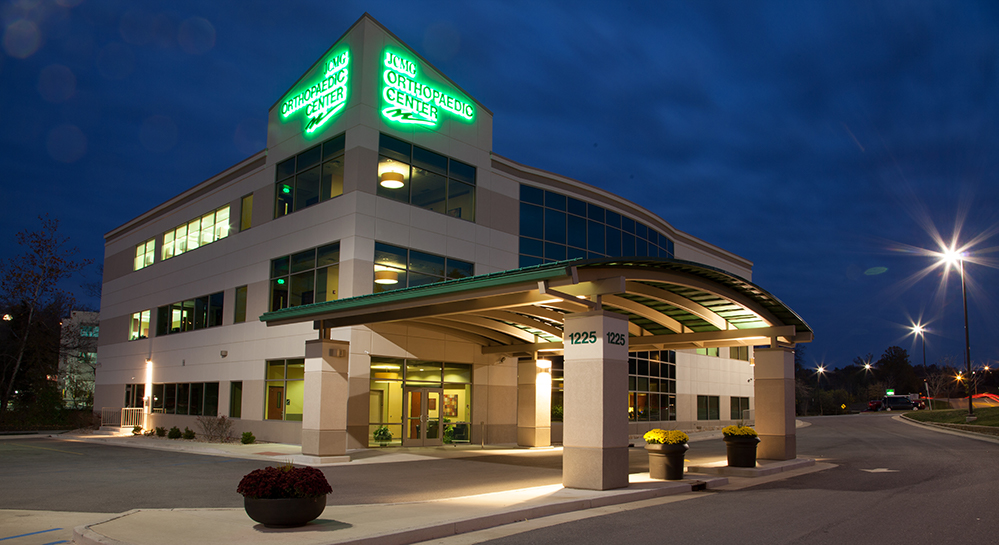
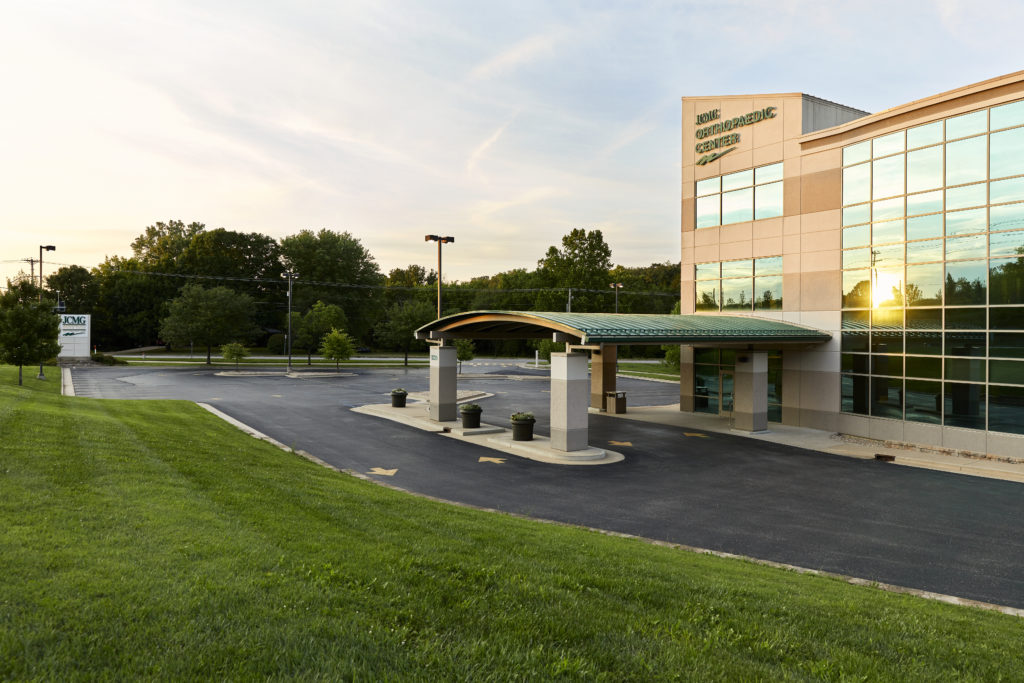
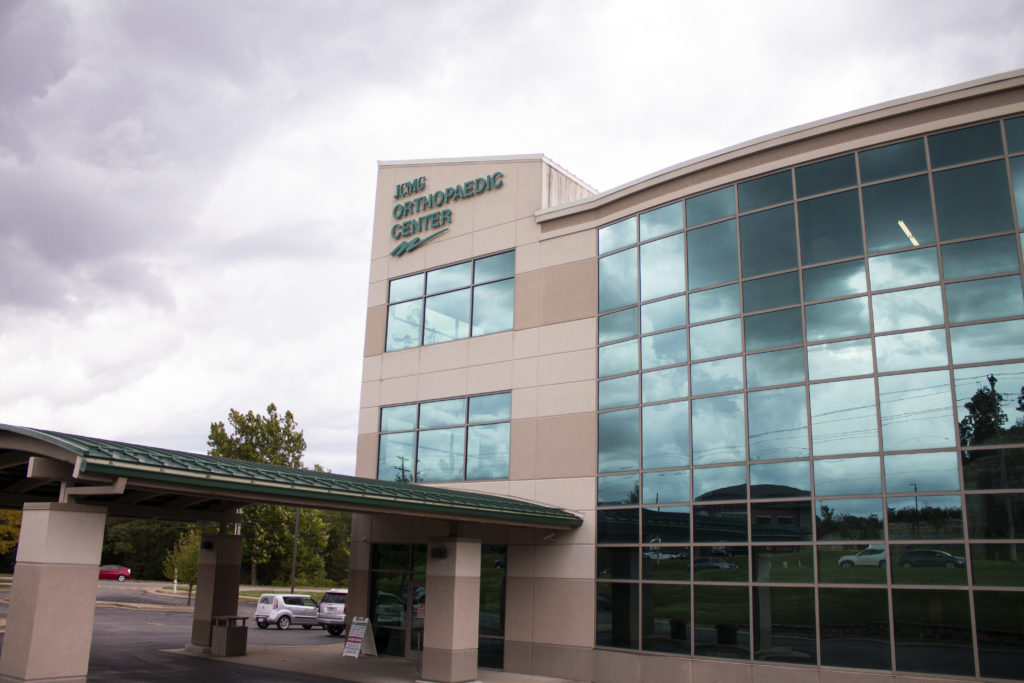

Whether you’re a high school quarterback, retired golfer, or just feeling the wear and tear of age—if you have pain, you want to see the orthopaedic or sports medicine specialists at JCMG. Orthopaedics & Sports Medicine focuses on injuries and diseases of the musculoskeletal system, including joints, bones, tendons, muscles, ligaments, and nerves.
Featuring physicians who trained at multiple institutions currently ranked in the top 10 nationally by US News and World Report, JCMG Orthopaedics & Sports Medicine specializes in sports injury treatment, joint replacement surgery, fracture care, hand surgery, and minimally invasive surgical options.
Our team works to preserve and restore musculoskeletal system structures that have been affected by age, traumatic injury, and athletic activity. Conditions treated include arthritis, fractures, sports injuries, and carpal tunnel syndrome. Treatment may include medical and surgical options.
We provide advanced approaches to joint replacement surgery (including outpatient joint replacement surgery), arthroscopic surgery, and hand surgery, as well as offer an array of regenerative sports medicine and stem cell therapies. Our goal is to treat pain and restore quality of life for our patients.



While preparing for total joint replacement surgery at the JCMG Surgery Center, there are a few things to keep in mind. Please read over this information carefully, as following all of these instructions is crucial for a safe and rapid recovery from surgery.
In preparation for your surgery, there are a few things you can do to get your home ready.
Physical therapy is extremely important in your recovery. We are going to have you do one or two sessions of physical therapy prior to your surgery where the therapist will instruct you on how to appropriately use the walker and give you some home exercises to work on. The therapist can also work with you on how to appropriately do stairs after surgery.
After the surgery, a physical therapist will come to your home within 48 hours to start working with you on your postoperative rehab. They will typically come to the house 3 to 4 times over the first couple of weeks, and then you should be ready to progress to outpatient physical therapy. Most patients will do physical therapy a couple of times a week for 6 to 12 weeks after their surgery.
It is important to do the home exercises and physical therapy after the surgery to avoid scar tissue and stiff joints.
Prior to surgery, we would ask that you obtain medical clearance from your family physician and/or cardiologist. It is helpful to have them evaluate you and make sure that you are healthy and safe enough to have the procedure.
We also ask that if you have not seen the dentist in the last 6 to 12 months, that you see a dentist and have them check to make sure you don’t have any evidence of dental infection that could potentially cause an infection in the surgical site.
Ask your doctor, cardiologist, and/or dentist to send letters of clearance to our office.
After the surgery, we ask that you not drive until you are off of any narcotic pain medicine. If it is your right knee or hip that is replaced, you will need to have normal control of the leg and good reflexes before returning to driving.
We don’t have a set day that you have to return to work. On average, most people will take off of work approximately one month. You may ease back into activities as you feel safe and comfortable.
Approximately two to three weeks prior to your surgery, we will have you do some lab work. You will also be given an appointment to meet with our anesthesiologist prior to your surgery. They will evaluate you and go over the anesthesia protocol with you. You will have a nerve block preoperatively which will help with your pain afterwards. Almost always, the surgery will be done under a spinal anesthetic.
While the joint replacement does immediately get rid of the arthritis, it is normal to have some swelling and pain afterwards.
Your pain should be well controlled with the oral medication that we will prescribe you. We will send in your prescriptions to the pharmacy of your choice the week before your surgery.
The surgery should eliminate the arthritic pain, but it will not make you 18 years old again. It is still possible to have inflammation in the soft tissue and still have occasional pain from other sources like tendinitis or bursitis.
Most studies show that approximately 80 to 85% of patients are satisfied with their joint replacement; however, JCMG Surgery Center feedback reports our outcomes are over 95% favorable. It is important to us that you feel safe and comfortable throughout this process.

JCMG Orthopaedics & Sports Medicine offers total hip replacement surgery, performed in an outpatient setting at the JCMG Surgery Center.
In the video below, Dr. Jonathan Craighead, an orthopaedic surgeon with Jefferson City Medical Group, covers all you need to know about getting a hip replacement surgery performed at the JCMG Surgery Center.
The most common reason to have hip replacement surgery is poorly controlled hip pain caused by arthritis. Arthritis is the medical term for damage to the cartilage of the joint. Cartilage is tissue that provides the cushion between the bone.
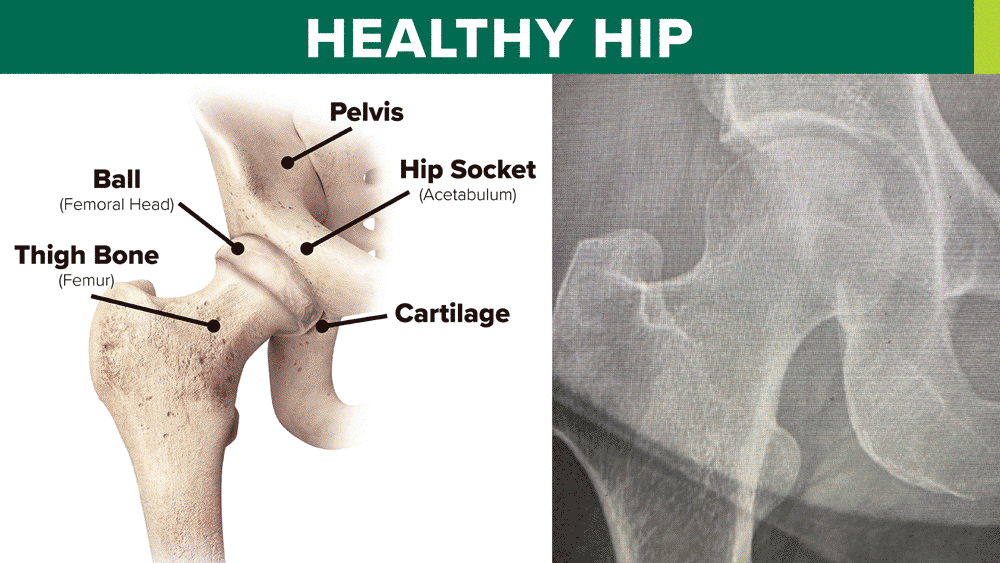
In a healthy hip, the ball and socket moves smoothly. In an arthritic hip, the joint space between the ball and socket is gone, with deformed bone-on-bone contact. Hip replacement surgery removes the bone-on-bone connection, replacing it with an artificial joint that restores healthy alignment.
Hip replacement surgery takes approximately one hour. We do an anterior approach to the hip, which means we are able to go between the muscles instead of cutting the muscles. This typically causes less pain and leads to a quicker recovery compared to a posterior or lateral approach to the hip.
During the surgery, we make an incision across the front of your hip and use special tools to remove the worn out ball of your hip. A metal prosthesis goes into the top of your thigh bone and a new ball is attached. Your worn out socket is reamed out and a new metal socket with a plastic liner is inserted. Now, instead of bone-on-bone, you have a new prosthetic ball and socket that no longer hurts when it is moved.
The risk of the surgery in healthy individuals is low.
We will have you wear compression stockings immediately following surgery on both legs for approximately one month after surgery. This helps to prevent swelling, stiffness, and blood clots.

JCMG Orthopaedics & Sports Medicine offers total knee replacement surgery, performed in an outpatient setting at the JCMG Surgery Center.
In the video below, Dr. Jonathan Craighead, an orthopaedic surgeon with Jefferson City Medical Group, covers all you need to know about getting a knee replacement surgery performed at the JCMG Surgery Center.
The most common reason to have knee replacement surgery is poorly controlled knee pain caused by arthritis of the knee. Arthritis is the medical term for damage to the cartilage of the joint. Cartilage is tissue that provides the cushion between the bone.
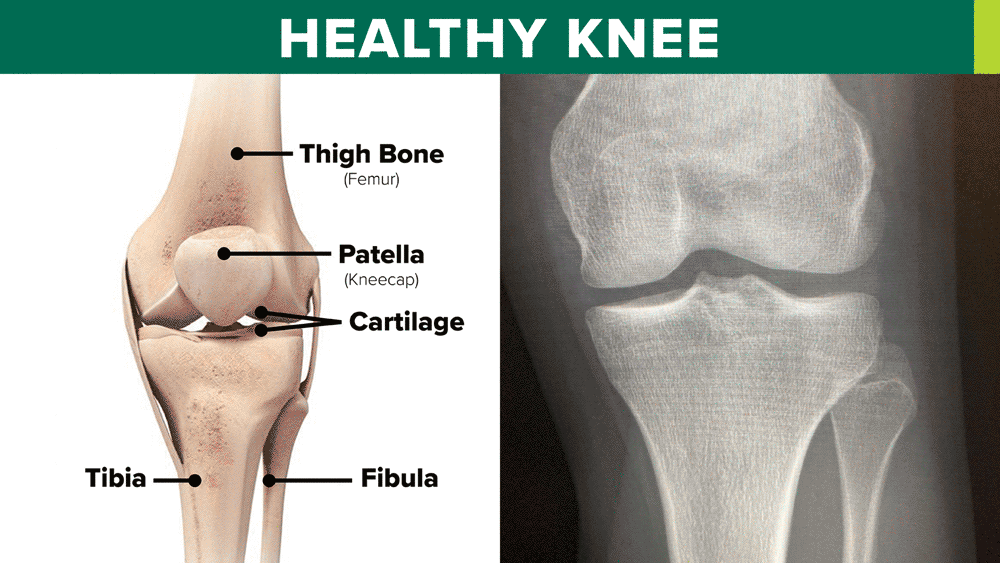
In a healthy knee, the bones are well-aligned and there is a healthy joint space between the thigh bone and shin bone where the normal cartilage is preserved. In an arthritic knee, the normal joint space has deteriorated, resulting in bone on bone contact and bowing of the knee. After knee replacement surgery, the artificial knee has restored the space between the bones and realigned the knee into proper position.
Knee replacement surgery takes approximately one hour. During the surgery, we make an incision over the front of the knee and use special tools to remove the edge of the bone and the damaged cartilage. The metal implant is then cemented to the end of the thigh and shin bone and there is a plastic spacer in between. Now when you go to move the knee, it no longer rubs bone-on-bone and now rubs metal and plastic.
Most patients will be ready to go home within one to three hours after their surgery. We will make sure that you are able to safely walk, that you are medically stable, and that your pain is controlled before letting you leave the surgery center.
The risk of the surgery in healthy individuals is low.
We will have you wear compression stockings immediately following surgery on both legs for approximately one month after surgery. This helps to prevent swelling, stiffness, and blood clots.

Whether you’re a high school quarterback, retired golfer, or just feeling the wear and tear of age—if you have pain, you want to see the orthopaedic or sports medicine specialists at JCMG. Orthopaedics & Sports Medicine focuses on injuries and diseases of the musculoskeletal system, including joints, bones, tendons, muscles, ligaments, and nerves.
Featuring physicians who trained at multiple institutions currently ranked in the top 10 nationally by US News and World Report, JCMG Orthopaedics & Sports Medicine specializes in sports injury treatment, joint replacement surgery, fracture care, hand surgery, and minimally invasive surgical options.
Our team works to preserve and restore musculoskeletal system structures that have been affected by age, traumatic injury, and athletic activity. Conditions treated include arthritis, fractures, sports injuries, and carpal tunnel syndrome. Treatment may include medical and surgical options.
We provide advanced approaches to joint replacement surgery (including outpatient joint replacement surgery), arthroscopic surgery, and hand surgery, as well as offer an array of regenerative sports medicine and stem cell therapies. Our goal is to treat pain and restore quality of life for our patients.

While preparing for total joint replacement surgery at the JCMG Surgery Center, there are a few things to keep in mind. Please read over this information carefully, as following all of these instructions is crucial for a safe and rapid recovery from surgery.
In preparation for your surgery, there are a few things you can do to get your home ready.
Physical therapy is extremely important in your recovery. We are going to have you do one or two sessions of physical therapy prior to your surgery where the therapist will instruct you on how to appropriately use the walker and give you some home exercises to work on. The therapist can also work with you on how to appropriately do stairs after surgery.
After the surgery, a physical therapist will come to your home within 48 hours to start working with you on your postoperative rehab. They will typically come to the house 3 to 4 times over the first couple of weeks, and then you should be ready to progress to outpatient physical therapy. Most patients will do physical therapy a couple of times a week for 6 to 12 weeks after their surgery.
It is important to do the home exercises and physical therapy after the surgery to avoid scar tissue and stiff joints.
Prior to surgery, we would ask that you obtain medical clearance from your family physician and/or cardiologist. It is helpful to have them evaluate you and make sure that you are healthy and safe enough to have the procedure.
We also ask that if you have not seen the dentist in the last 6 to 12 months, that you see a dentist and have them check to make sure you don’t have any evidence of dental infection that could potentially cause an infection in the surgical site.
Ask your doctor, cardiologist, and/or dentist to send letters of clearance to our office.
After the surgery, we ask that you not drive until you are off of any narcotic pain medicine. If it is your right knee or hip that is replaced, you will need to have normal control of the leg and good reflexes before returning to driving.
We don’t have a set day that you have to return to work. On average, most people will take off of work approximately one month. You may ease back into activities as you feel safe and comfortable.
Approximately two to three weeks prior to your surgery, we will have you do some lab work. You will also be given an appointment to meet with our anesthesiologist prior to your surgery. They will evaluate you and go over the anesthesia protocol with you. You will have a nerve block preoperatively which will help with your pain afterwards. Almost always, the surgery will be done under a spinal anesthetic.
While the joint replacement does immediately get rid of the arthritis, it is normal to have some swelling and pain afterwards.
Your pain should be well controlled with the oral medication that we will prescribe you. We will send in your prescriptions to the pharmacy of your choice the week before your surgery.
The surgery should eliminate the arthritic pain, but it will not make you 18 years old again. It is still possible to have inflammation in the soft tissue and still have occasional pain from other sources like tendinitis or bursitis.
Most studies show that approximately 80 to 85% of patients are satisfied with their joint replacement; however, JCMG Surgery Center feedback reports our outcomes are over 95% favorable. It is important to us that you feel safe and comfortable throughout this process.

JCMG Orthopaedics & Sports Medicine offers total hip replacement surgery, performed in an outpatient setting at the JCMG Surgery Center.
In the video below, Dr. Jonathan Craighead, an orthopaedic surgeon with Jefferson City Medical Group, covers all you need to know about getting a hip replacement surgery performed at the JCMG Surgery Center.
The most common reason to have hip replacement surgery is poorly controlled hip pain caused by arthritis. Arthritis is the medical term for damage to the cartilage of the joint. Cartilage is tissue that provides the cushion between the bone.

In a healthy hip, the ball and socket moves smoothly. In an arthritic hip, the joint space between the ball and socket is gone, with deformed bone-on-bone contact. Hip replacement surgery removes the bone-on-bone connection, replacing it with an artificial joint that restores healthy alignment.
Hip replacement surgery takes approximately one hour. We do an anterior approach to the hip, which means we are able to go between the muscles instead of cutting the muscles. This typically causes less pain and leads to a quicker recovery compared to a posterior or lateral approach to the hip.
During the surgery, we make an incision across the front of your hip and use special tools to remove the worn out ball of your hip. A metal prosthesis goes into the top of your thigh bone and a new ball is attached. Your worn out socket is reamed out and a new metal socket with a plastic liner is inserted. Now, instead of bone-on-bone, you have a new prosthetic ball and socket that no longer hurts when it is moved.
The risk of the surgery in healthy individuals is low.
We will have you wear compression stockings immediately following surgery on both legs for approximately one month after surgery. This helps to prevent swelling, stiffness, and blood clots.

JCMG Orthopaedics & Sports Medicine offers total knee replacement surgery, performed in an outpatient setting at the JCMG Surgery Center.
In the video below, Dr. Jonathan Craighead, an orthopaedic surgeon with Jefferson City Medical Group, covers all you need to know about getting a knee replacement surgery performed at the JCMG Surgery Center.
The most common reason to have knee replacement surgery is poorly controlled knee pain caused by arthritis of the knee. Arthritis is the medical term for damage to the cartilage of the joint. Cartilage is tissue that provides the cushion between the bone.

In a healthy knee, the bones are well-aligned and there is a healthy joint space between the thigh bone and shin bone where the normal cartilage is preserved. In an arthritic knee, the normal joint space has deteriorated, resulting in bone on bone contact and bowing of the knee. After knee replacement surgery, the artificial knee has restored the space between the bones and realigned the knee into proper position.
Knee replacement surgery takes approximately one hour. During the surgery, we make an incision over the front of the knee and use special tools to remove the edge of the bone and the damaged cartilage. The metal implant is then cemented to the end of the thigh and shin bone and there is a plastic spacer in between. Now when you go to move the knee, it no longer rubs bone-on-bone and now rubs metal and plastic.
Most patients will be ready to go home within one to three hours after their surgery. We will make sure that you are able to safely walk, that you are medically stable, and that your pain is controlled before letting you leave the surgery center.
The risk of the surgery in healthy individuals is low.
We will have you wear compression stockings immediately following surgery on both legs for approximately one month after surgery. This helps to prevent swelling, stiffness, and blood clots.
1225 West Stadium Blvd
Jefferson City, MO 65109
3520 West Edgewood Drive
Jefferson City, MO 65109
1225 West Stadium Blvd
Jefferson City, MO 65109
3520 West Edgewood Drive
Jefferson City, MO 65109
1225 West Stadium Blvd
Jefferson City, MO 65109
1225 West Stadium Blvd
Jefferson City, MO 65109
1225 West Stadium Blvd
Jefferson City, MO 65109
3520 West Edgewood Drive
Jefferson City, MO 65109
1225 West Stadium Blvd
Jefferson City, MO 65109
3520 West Edgewood Drive
Jefferson City, MO 65109
1225 West Stadium Blvd
Jefferson City, MO 65109
1225 West Stadium Blvd
Jefferson City, MO 65109
1225 West Stadium Blvd
Jefferson City, MO 65109
3520 West Edgewood Drive
Jefferson City, MO 65109
1225 West Stadium Blvd
Jefferson City, MO 65109
3520 West Edgewood Drive
Jefferson City, MO 65109
1225 West Stadium Blvd
Jefferson City, MO 65109
3520 West Edgewood Drive
Jefferson City, MO 65109
1225 West Stadium Blvd
Jefferson City, MO 65109
3520 West Edgewood Drive
Jefferson City, MO 65109